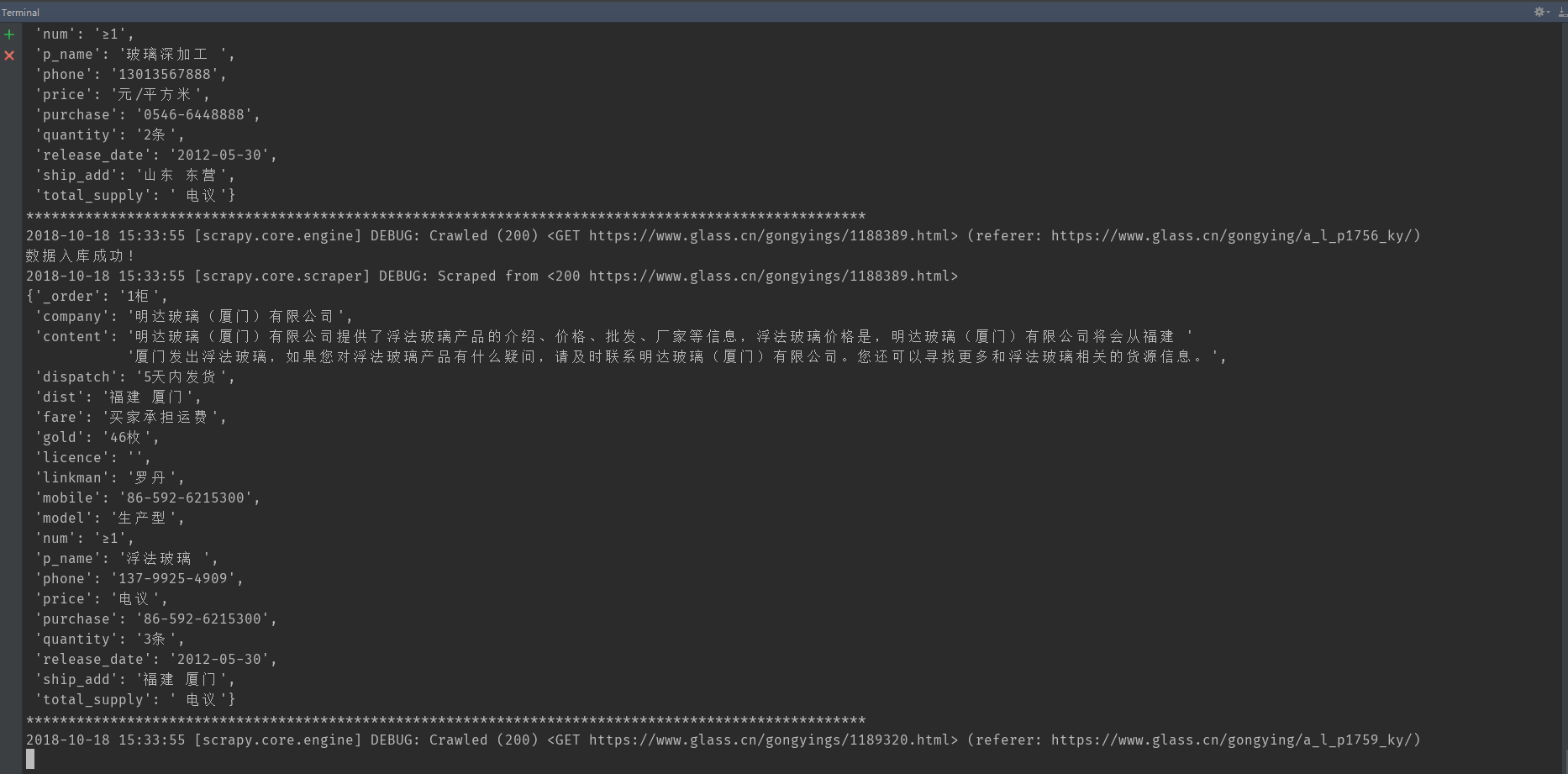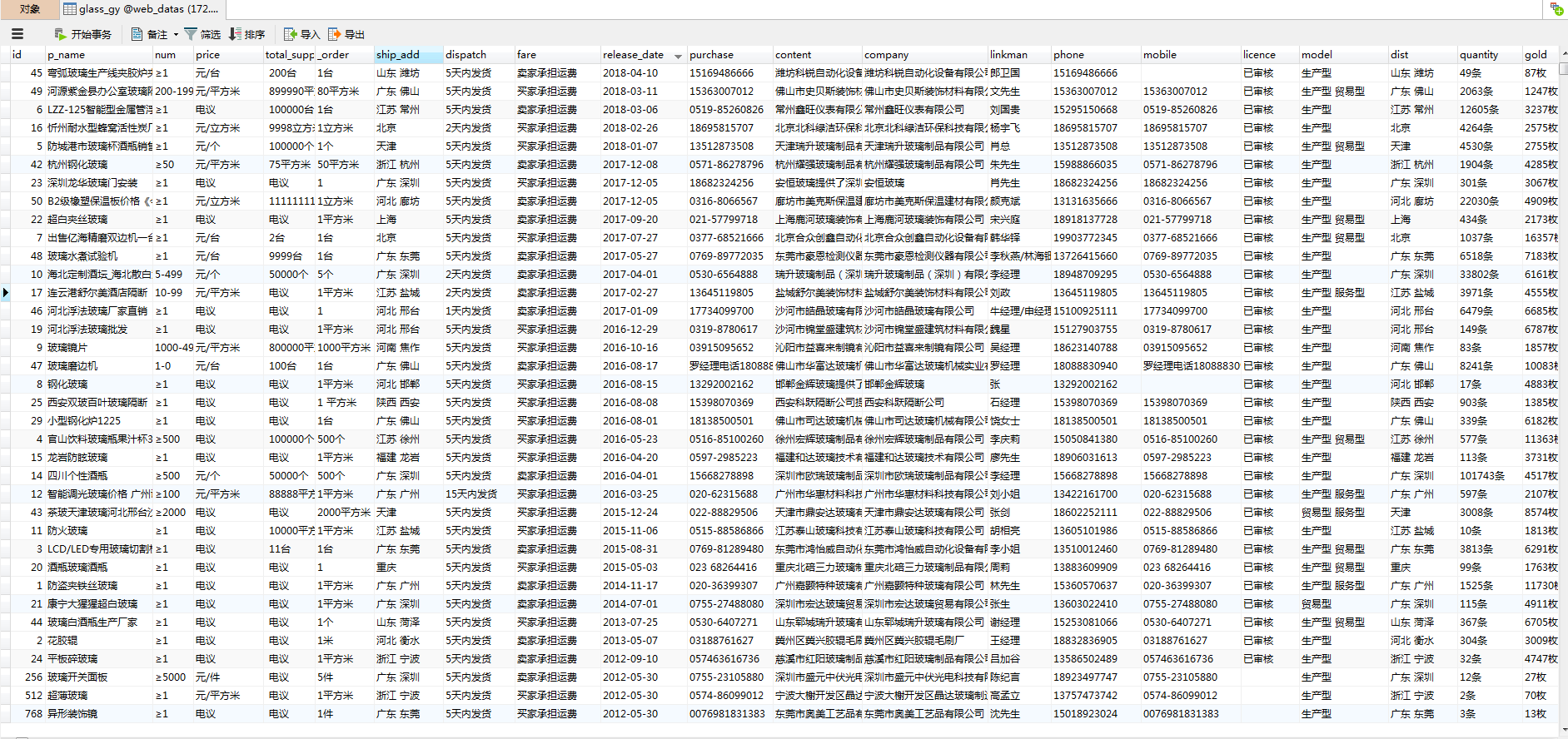1.
采集目标地址 https://www.glass.cn/gongying/sellindex.aspx 网站比较简单,没什么大的需要注意的问题。
2.
通过分析测试 https://www.glass.cn/gongying/a_l_p1_ky/ 等价于目标采集网站首页,只需设置{}.format 翻页
这个完整比较简单,就是获取一下页码,再做一下翻页,循环采集页面跳转url,再进入url采集页面内容信息。
3.
采集数据过程及结果


#glass_gy.py
# -*- coding: utf-8 -*-
import scrapy
import re
from glass_gy_web.items import GlassGyWebItem
class GlassGySpider(scrapy.Spider):
name = 'glass_gy'
allowed_domains = ['www.glass.cn']
start_urls = ['https://www.glass.cn/gongying/a_l_p1_ky/']
custom_settings = {
'DOWNLOAD_DELAY': 0.5,
"ITEM_PIPELINES": {
'glass_gy_web.pipelines.MysqlPipeline': 300,
},
"DOWNLOADER_MIDDLEWARES": {
'glass_gy_web.middlewares.GlassGyWebDownloaderMiddleware': 500,
},
}
def parse(self, response):
link_urls = response.xpath("//div[@class='brandinfotxt z']/h4[@class='brandHTit clearfix']/a/@href").extract()
for link_url in link_urls:
# print(link_url)
yield scrapy.Request(url=link_url, callback=self.parse_detail)
# print('*'*100)
# 翻页
pg_num = re.findall('共(.*?)页',response.text)
# print(pg_num[0])
for i in range(2, int(pg_num[0])+1):
url = 'https://www.glass.cn/gongying/a_l_p{}_ky/'.format(i)
yield scrapy.Request(url=url, callback=self.parse)
def parse_detail(self, response):
item=GlassGyWebItem()
# 产品名称
p_name = response.xpath("//div[@class='ProductDel']/h1/text()").extract_first()
item['p_name'] = p_name
# 数量
num = response.xpath("//table//tr/td[@class='bot'][1]/text()").extract_first()
item['num'] = num
# 价格
price = response.xpath("//table//tr/td[@class='bot'][2]/text()").extract_first()
item['price'] = price
# 供货总量
total_supply = re.findall('<li><span>供货总量:</span>(.*?)</li>',response.text)
item['total_supply'] = total_supply[0]
# 最小起订
_order = re.findall('<li><span>最小起订: </span>(.*?)</li>',response.text)
item['_order'] = _order[0]
# 发货地址
ship_add = re.findall('<li><span>发货地址: </span>(.*?)</li>',response.text)
item['ship_add'] = ship_add[0]
# 发货期限
dispatch = re.findall('<li><span>发货期限: </span>(.*?)</li>',response.text)
item['dispatch'] = dispatch[0]
# 物流运费
fare = re.findall('<li><span>物流运费: </span>(.*?)</li>',response.text)
item['fare'] = fare[0]
# 发布日期
release_date = re.findall('<li><span>发布日期:</span>(.*?)</li>',response.text)
item['release_date'] = release_date[0]
# 采购电话
purchase = re.findall('<div class="sell_tel clearfix"><span>采购电话:</span>(.*?)</div>',response.text)
item['purchase'] = purchase[0]
# 产品详情
content = response.xpath("//div[@id='pdetail']/text()").extract()
item['content'] = content[-1].strip()
# 公司名称
company = response.xpath("//div[@class='zcbw']/h2/a/text()").extract_first()
item['company'] = company
# 联系人
linkman = re.findall('<span>联系人:(.*?)</span>',response.text)
item['linkman'] = linkman[0]
# 手机
phone = re.findall('<li>手机:(.*?)</li>',response.text)
item['phone'] = phone[0]
# 电话
mobile = re.findall('<li>电话:(.*?)</li>',response.text)
item['mobile'] = mobile[0]
# 营业执照
try:
licence = re.findall('<li>营业执照:(.*?) <img',response.text)
licence = licence[0]
except:
licence = ""
item['licence'] = licence
# 经营模式
try:
model = re.findall('<li>经营模式: (.*?)</li',response.text)
model = model[0]
except:
model = ""
item['model'] = model
# 所在地区
dist = re.findall('<li>所在地区:(.*?)</li>',response.text)
item['dist'] = dist[0]
# 产品数量
quantity = re.findall('<li>产品数量:(.*?)</li>',response.text)
item['quantity'] = quantity[0]
# 玻璃金币
gold = re.findall('<li>玻璃金币:(.*?)</li>',response.text)
item['gold'] = gold[0]
yield item
print('*'*100)
# items.py
# -*- coding: utf-8 -*-
# Define here the models for your scraped items
#
# See documentation in:
# https://doc.scrapy.org/en/latest/topics/items.html
import scrapy
class GlassGyWebItem(scrapy.Item):
# define the fields for your item here like:
# name = scrapy.Field()
# 产品名称
p_name = scrapy.Field()
# 数量
num = scrapy.Field()
# 价格
price = scrapy.Field()
# 供货总量
total_supply = scrapy.Field()
# 最小起订
_order = scrapy.Field()
# 发货地址
ship_add = scrapy.Field()
# 发货期限
dispatch = scrapy.Field()
# 物流运费
fare = scrapy.Field()
# 发布日期
release_date = scrapy.Field()
# 采购电话
purchase = scrapy.Field()
# 产品详情
content = scrapy.Field()
# 公司名称
company = scrapy.Field()
# 联系人
linkman = scrapy.Field()
# 手机
phone = scrapy.Field()
# 电话
mobile = scrapy.Field()
# 营业执照
licence = scrapy.Field()
# 经营模式
model = scrapy.Field()
# 所在地区
dist = scrapy.Field()
# 产品数量
quantity = scrapy.Field()
# 玻璃金币
gold = scrapy.Field()
# piplines.py
# -*- coding: utf-8 -*-
# Define your item pipelines here
#
# Don't forget to add your pipeline to the ITEM_PIPELINES setting
# See: https://doc.scrapy.org/en/latest/topics/item-pipeline.html
from scrapy.conf import settings
import pymysql
class GlassGyWebPipeline(object):
def process_item(self, item, spider):
return item
# 数据保存mysql
class MysqlPipeline(object):
def open_spider(self, spider):
self.host = settings.get('MYSQL_HOST')
self.port = settings.get('MYSQL_PORT')
self.user = settings.get('MYSQL_USER')
self.password = settings.get('MYSQL_PASSWORD')
self.db = settings.get(('MYSQL_DB'))
self.table = settings.get('TABLE')
self.client = pymysql.connect(host=self.host, user=self.user, password=self.password, port=self.port, db=self.db, charset='utf8')
def process_item(self, item, spider):
item_dict = dict(item)
cursor = self.client.cursor()
values = ','.join(['%s'] * len(item_dict))
keys = ','.join(item_dict.keys())
sql = 'INSERT INTO {table}({keys}) VALUES ({values})'.format(table=self.table, keys=keys, values=values)
try:
if cursor.execute(sql, tuple(item_dict.values())): # 第一个值为sql语句第二个为 值 为一个元组
print('数据入库成功!')
self.client.commit()
except Exception as e:
print(e)
print('数据已存在!')
self.client.rollback()
return item
def close_spider(self, spider):
self.client.close()
#settings.py
# -*- coding: utf-8 -*-
# Scrapy settings for glass_gy_web project
#
# For simplicity, this file contains only settings considered important or
# commonly used. You can find more settings consulting the documentation:
#
# https://doc.scrapy.org/en/latest/topics/settings.html
# https://doc.scrapy.org/en/latest/topics/downloader-middleware.html
# https://doc.scrapy.org/en/latest/topics/spider-middleware.html
BOT_NAME = 'glass_gy_web'
SPIDER_MODULES = ['glass_gy_web.spiders']
NEWSPIDER_MODULE = 'glass_gy_web.spiders'
# Crawl responsibly by identifying yourself (and your website) on the user-agent
#USER_AGENT = 'glass_gy_web (+http://www.yourdomain.com)'
# Obey robots.txt rules
ROBOTSTXT_OBEY = False
# mysql配置参数
MYSQL_HOST = "172.16.10.157"
MYSQL_PORT = 3306
MYSQL_USER = "root"
MYSQL_PASSWORD = "123456"
MYSQL_DB = 'web_datas'
TABLE = "glass_gy"
# Configure maximum concurrent requests performed by Scrapy (default: 16)
#CONCURRENT_REQUESTS = 32
# Configure a delay for requests for the same website (default: 0)
# See https://doc.scrapy.org/en/latest/topics/settings.html#download-delay
# See also autothrottle settings and docs
#DOWNLOAD_DELAY = 3
# The download delay setting will honor only one of:
#CONCURRENT_REQUESTS_PER_DOMAIN = 16
#CONCURRENT_REQUESTS_PER_IP = 16
# Disable cookies (enabled by default)
#COOKIES_ENABLED = False
# Disable Telnet Console (enabled by default)
#TELNETCONSOLE_ENABLED = False
# Override the default request headers:
#DEFAULT_REQUEST_HEADERS = {
# 'Accept': 'text/html,application/xhtml+xml,application/xml;q=0.9,*/*;q=0.8',
# 'Accept-Language': 'en',
#}
# Enable or disable spider middlewares
# See https://doc.scrapy.org/en/latest/topics/spider-middleware.html
#SPIDER_MIDDLEWARES = {
# 'glass_gy_web.middlewares.GlassGyWebSpiderMiddleware': 543,
#}
# Enable or disable downloader middlewares
# See https://doc.scrapy.org/en/latest/topics/downloader-middleware.html
DOWNLOADER_MIDDLEWARES = {
'glass_gy_web.middlewares.GlassGyWebDownloaderMiddleware': 543,
}
# Enable or disable extensions
# See https://doc.scrapy.org/en/latest/topics/extensions.html
#EXTENSIONS = {
# 'scrapy.extensions.telnet.TelnetConsole': None,
#}
# Configure item pipelines
# See https://doc.scrapy.org/en/latest/topics/item-pipeline.html
ITEM_PIPELINES = {
'glass_gy_web.pipelines.GlassGyWebPipeline': 300,
}
# Enable and configure the AutoThrottle extension (disabled by default)
# See https://doc.scrapy.org/en/latest/topics/autothrottle.html
#AUTOTHROTTLE_ENABLED = True
# The initial download delay
#AUTOTHROTTLE_START_DELAY = 5
# The maximum download delay to be set in case of high latencies
#AUTOTHROTTLE_MAX_DELAY = 60
# The average number of requests Scrapy should be sending in parallel to
# each remote server
#AUTOTHROTTLE_TARGET_CONCURRENCY = 1.0
# Enable showing throttling stats for every response received:
#AUTOTHROTTLE_DEBUG = False
# Enable and configure HTTP caching (disabled by default)
# See https://doc.scrapy.org/en/latest/topics/downloader-middleware.html#httpcache-middleware-settings
#HTTPCACHE_ENABLED = True
#HTTPCACHE_EXPIRATION_SECS = 0
#HTTPCACHE_DIR = 'httpcache'
#HTTPCACHE_IGNORE_HTTP_CODES = []
#HTTPCACHE_STORAGE = 'scrapy.extensions.httpcache.FilesystemCacheStorage'
#middlewares.py
# -*- coding: utf-8 -*-
# Define here the models for your spider middleware
#
# See documentation in:
# https://doc.scrapy.org/en/latest/topics/spider-middleware.html
from scrapy import signals
class GlassGyWebSpiderMiddleware(object):
# Not all methods need to be defined. If a method is not defined,
# scrapy acts as if the spider middleware does not modify the
# passed objects.
@classmethod
def from_crawler(cls, crawler):
# This method is used by Scrapy to create your spiders.
s = cls()
crawler.signals.connect(s.spider_opened, signal=signals.spider_opened)
return s
def process_spider_input(self, response, spider):
# Called for each response that goes through the spider
# middleware and into the spider.
# Should return None or raise an exception.
return None
def process_spider_output(self, response, result, spider):
# Called with the results returned from the Spider, after
# it has processed the response.
# Must return an iterable of Request, dict or Item objects.
for i in result:
yield i
def process_spider_exception(self, response, exception, spider):
# Called when a spider or process_spider_input() method
# (from other spider middleware) raises an exception.
# Should return either None or an iterable of Response, dict
# or Item objects.
pass
def process_start_requests(self, start_requests, spider):
# Called with the start requests of the spider, and works
# similarly to the process_spider_output() method, except
# that it doesn’t have a response associated.
# Must return only requests (not items).
for r in start_requests:
yield r
def spider_opened(self, spider):
spider.logger.info('Spider opened: %s' % spider.name)
class GlassGyWebDownloaderMiddleware(object):
# Not all methods need to be defined. If a method is not defined,
# scrapy acts as if the downloader middleware does not modify the
# passed objects.
@classmethod
def from_crawler(cls, crawler):
# This method is used by Scrapy to create your spiders.
s = cls()
crawler.signals.connect(s.spider_opened, signal=signals.spider_opened)
return s
def process_request(self, request, spider):
# Called for each request that goes through the downloader
# middleware.
# Must either:
# - return None: continue processing this request
# - or return a Response object
# - or return a Request object
# - or raise IgnoreRequest: process_exception() methods of
# installed downloader middleware will be called
return None
def process_response(self, request, response, spider):
# Called with the response returned from the downloader.
# Must either;
# - return a Response object
# - return a Request object
# - or raise IgnoreRequest
return response
def process_exception(self, request, exception, spider):
# Called when a download handler or a process_request()
# (from other downloader middleware) raises an exception.
# Must either:
# - return None: continue processing this exception
# - return a Response object: stops process_exception() chain
# - return a Request object: stops process_exception() chain
pass
def spider_opened(self, spider):
spider.logger.info('Spider opened: %s' % spider.name)

